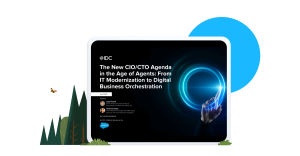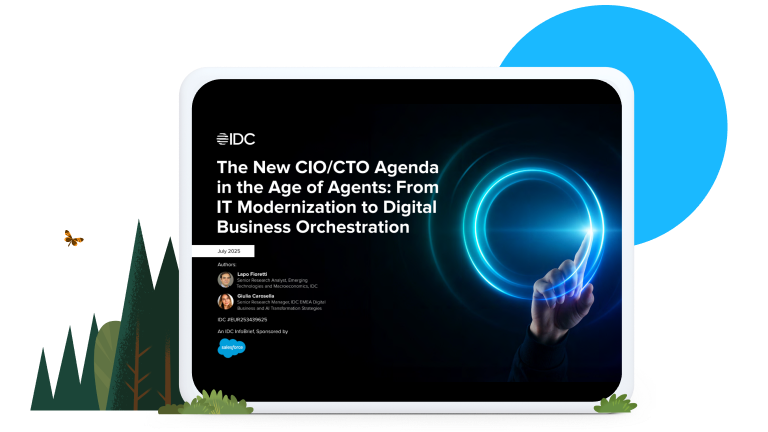The New CIO/CTO Agenda: Orchestrating Digital Business in the Age of AI Agents



CIOs and CTOs are at a pivotal crossroads — no longer just managing IT but orchestrating digital transformation amid an unprecedented wave of AI innovation. With 97% of EMEA CIOs already deploying or planning to deploy AI agents in their organizations [1], the question isn’t if, but how you’ll lead this next era. What’s at stake is competitiveness, growth, and value creation.
The AI Revolution: From Concept to Reality
The promise of AI is no longer just hype — it’s reshaping how businesses operate. EMEA executives are increasingly focused on ensuring that AI investments deliver measurable value and clear ROI, with many prioritizing tangible business impacts as they scale their AI initiatives. Through AI agents, digital workforces offer a promising opportunity to achieve unprecedented efficiency and value creation.
How Should CIOs and CTOs Prioritize and Implement AI Agents to Deliver Tangible Business Outcomes?
By 2027, AI-driven workflows are expected to have reshaped 40% of knowledge work, potentially doubling productivity [2]. But this isn’t about replacing humans — it’s about augmentation. A CIO from an EMEA manufacturing company told IDC: “For a CIO to be successful in the age of AI, you should be focusing on business understanding and business acumen. Because if you don’t understand what’s truly bringing value to the business, AI will just be another fluke.” The challenge for CIOs is to foster a culture of adaptability and continuous learning, which should be done by investing in upskilling programs, seamlessly integrating AI agents into existing ecosystems, and adopting a problem-first approach to AI deployment.
Architecting the Future: Building the Digital Backbone
The journey isn’t without hurdles. Last year, out of EMEA organizations surveyed by IDC, only 13% of AI-focused proofs of concept made it to production [3]. The key to success? Clear business objectives and well-defined use cases. A solid, integrated technology architecture is the foundation of AI success. Yet 34% of EMEA organizations cite inadequate infrastructure as a major barrier [4]. Those with a robust digital business architecture are seeing faster outcomes: IDC predicts a threefold increase in data value generation by 2026 [5]. A robust digital business architecture is essential for CIOs to break down silos, align IT capabilities with business objectives, and prepare for seamless integration of emerging technologies. It provides a structured framework to connect strategy with innovation, map current operations, and chart a clear path to future objectives.
Data: The Lifeblood of AI Success
There’s no AI without data — but only 13% of surveyed EMEA organizations are using data Strategically [6]. Organizations must prioritize frameworks that ensure data quality, compliance, and security. To fully realize AI’s potential, they must treat data as a strategic asset. This means enforcing strong governance, ensuring data quality and security, and fostering transparency so data is accessible and trusted. Clear roles empower stakeholders to take ownership and make informed decisions. Ultimately, data readiness builds the trust and accountability essential for successful AI-driven innovation. Data readiness also means integration. One additional consideration for CIOs is the elimination of siloed barriers within their organizations: Internal silos prevent data from being effectively integrated, hindering the success of AI initiatives.
Build or Buy? Crafting Your AI Strategy
When it comes to AI models, 36% of EMEA organizations prefer leveraging platforms with fine- tuned models [7]. But the right approach depends on your unique circumstances — and choosing the right AI model is just one component contributing to the successful implementation of AI. Consider factors like total cost of ownership, ROI timelines, in-house expertise, and alignment with broader digital transformation goals. Prioritize composable AI platforms for scalability and leverage vendor expertise where it makes sense. Composable AI delivers modularity and flexibility, enabling organizations to adapt and scale AI solutions as needs change and without being tied to rigid systems. Leveraging vendor expertise provides access to proven tools and support, accelerating deployment and reducing reliance on in-house resources. This ensures that AI investments stay agile, cost-effective, and aligned with evolving business goals.
Collaboration is Key: Aligning with the C-Suite
Poor coordination between IT and business teams hampers 40% of AI initiatives [8]. Success demands close collaboration between the entire C-suite and emerging tech roles like Chief AI Officers. To successfully integrate AI agents, CIOs and CTOs must focus on business outcomes rather than just technical capabilities. This requires diligent collaboration with the rest of the C- suite and the translation of technology initiatives into clear, measurable business benefits. Forming cross-functional teams is essential to develop practical use case road maps that align with organizational goals. Throughout the process, be ready to showcase how AI investments deliver real, quantifiable value and strong ROI to the business.
5 Insights for CIOs in the AI Age
- Define and measure ROI across the enterprise, working closely with business leaders to assess the economic impact of AI investments.
- Develop your skills as a business strategist, mastering both technology expertise and broader business acumen.
- Put data at the core of your AI strategy. Prioritize accuracy, accessibility, security, and governance to drive reliable outcomes.
- Invest heavily in talent development and change management. Seamless AI integration requires an upskilled, adaptable workforce.
- Design an AI-centric enterprise architecture that aligns advanced capabilities with strategic business objectives, enhancing scalability and adaptability.
The Road Ahead: From IT Management to Digital Orchestrator
CIOs and CTOs are in an exceptional position to thrive in mastering modernization, innovation, risk management, and cost optimization. Being tasked with balancing technological transformation against measurable business outcomes is a challenging role, but one that offers immense opportunity for those ready to seize it.
The future of business is digital — and it’s being shaped by AI. As CIOs and CTOs, you have a unique opportunity to transcend traditional IT management and emerge as a true strategic business leader. By focusing on empowering your digital workforce through agentic AI, architecting a robust technology infrastructure, ensuring data readiness, making smart AI investment decisions, and fostering deep C-suite collaboration, you can successfully orchestrate your organization’s digital business initiatives in this new age of AI agents.
The opportunity is clear: Become a Digital Business Orchestrator. Drive innovation, security, modernization, and strategic alignment across your organization. This transformation isn’t just about implementing technology — it’s about reshaping business models, fostering a culture of innovation, and positioning your organization for success in an increasingly AI-driven world.
More on the New CIO/CTO Agenda?
Dive deeper into the strategic shifts and actionable insights needed to thrive in the age of AI agents. Download the full IDC InfoBrief sponsored by Salesforce, and unlock the blueprint for success.

- [1] IDC’s CIO Quick Poll for C-Suite Program Survey 2025, February 2025; EMEA n = 71
- [2] IDC’s EMEA FutureScape Predictions, December 2024
- [3] IDC’s Future Enterprise Resiliency and Spending Survey Wave 4, April 2024; EMEA n = 200
- [4] IDC’s Future Enterprise Resiliency and Spending Survey Wave 4, April 2024; EMEA n = 200
- [5] IDC’s EMEA FutureScape Predictions, December 2024
- [6] IDC EMEA’s Digital Executive Sentiment Survey, September 2024; N = 940
- [7] IDC’s Worldwide AI Use Case Survey, August 2024; EMEA respondents n = 908
- [8] IDC’s Future Enterprise Resiliency and Spending Survey Wave 4, April 2024; EMEA respondents n = 200






















